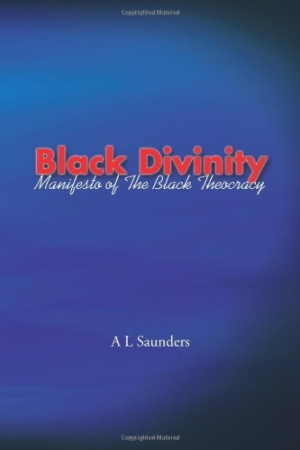
Black Divinity
Manifesto of the Black Theocracy
Black Divinity by A. L. Saunders presents a look at God from the perspective of African-American street culture. Saunders’s book will challenge readers, bringing hope to those who feel disenfranchised and knowledge to those who seek understanding of views on God from this unique perspective.
Saunders sums up his topic this way: “The black theocracy is itself a system based on the identifying of a black theodicy, that is, a study of God’s righteousness and benevolence from a black person’s perspective. Having arisen from the black streets of New York as the Godbody, the black theocracy is based primarily on the use of codes and culture to find black identity amid difficult and adverse situations of racism, poverty, marginalization, dyseducation [sic], demonization, humiliation, and habitual incarceration.” Saunders presents this theocracy as an alternative to “neoliberal Americanism” and “authoritarian Marxism.”
Saunders’s well-researched, historical book takes an intellectual approach that may surprise some readers because of its subject matter. Following an orderly progression from the introductory chapter, “God in Western Development,” to black theodicy and theocracy and the development of a “black divinity,” Black Divinity is controversial in its concepts, yet self-aware and unapologetic in its presentation. Saunders’s writing, however, is often a bit wordy and tedious and the complicated syntax requires considerable concentration from readers.
Saunders’s assertions may make more moderate readers uncomfortable—he refers to people as gods and suggests adopting certain gang rules. A former member of the Crips and Godbody, a fringe group of the Nation of Islam, and now Rastafarian, his credentials and background may impress some readers leery and make otehrs leery. Regardless, Saunders has intimate knowledge of the culture of the streets, and he has been involved in a number of positive worldwide movements such as the fair-trade initiative and Make Poverty History campaign.
Saunders’s views are not exclusive to people of African descent. He writes that, “We must also maintain a multiracial outlook and membership so as to prevent the use of racial loyalties or offenses from blocking or obstructing out proletarian solidarity.” His views also draw from a wide range of religious traditions, from Christianity to Islam; as a result, the book seems to encompass everyone but will likely alienate less radical thinkers. Saunders pays particular attention to Christianity because of its prevalence and the way societies have used religion to help others or to justify harming others.
For those with whom Saunders’s message resonates—people who grew up on the streets or are simply tired of the status quo—Black Divinity will be a welcome publication. For others, Saunders’s book sheds light on a little-known type of theocracy.
Reviewed by
Melissa Wuske
Disclosure: This article is not an endorsement, but a review. The publisher of this book provided free copies of the book and paid a small fee to have their book reviewed by a professional reviewer. Foreword Reviews and Clarion Reviews make no guarantee that the publisher will receive a positive review. Foreword Magazine, Inc. is disclosing this in accordance with the Federal Trade Commission’s 16 CFR, Part 255.
